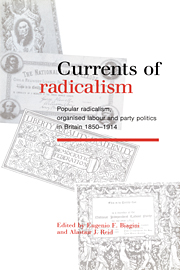 Currents of Radicalism
Currents of Radicalism Book contents
- Frontmatter
- Contents
- Notes on contributors
- Preface
- 1 Currents of radicalism, 1850–1914
- Part I Continuities in popular radicalism
- Part II The Liberal party and the people
- Part III Radicals, Liberals, and the Labour party
- 9 Labour and parliament: the Lib.-Labs. as the first working-class MPs, 1885–1906
- 10 Old Unionism reconsidered: the radicalism of Robert Knight, 1870–1900
- 11 Labour and local politics: radicalism, democracy and social reform, 1880–1914
- 12 Ideological debate in Edwardian Labour politics: radicalism, Revisionism and socialism
- Index
10 - Old Unionism reconsidered: the radicalism of Robert Knight, 1870–1900
from Part III - Radicals, Liberals, and the Labour party
Published online by Cambridge University Press: 07 September 2010
- Frontmatter
- Contents
- Notes on contributors
- Preface
- 1 Currents of radicalism, 1850–1914
- Part I Continuities in popular radicalism
- Part II The Liberal party and the people
- Part III Radicals, Liberals, and the Labour party
- 9 Labour and parliament: the Lib.-Labs. as the first working-class MPs, 1885–1906
- 10 Old Unionism reconsidered: the radicalism of Robert Knight, 1870–1900
- 11 Labour and local politics: radicalism, democracy and social reform, 1880–1914
- 12 Ideological debate in Edwardian Labour politics: radicalism, Revisionism and socialism
- Index
Summary
The established trade union leadership of the late nineteenth century has perhaps the least impressive reputation of its kind among British labour historians. Like most of their counterparts in other generations they have been condemned by Marxists for their commitment to gradual and constitutional change, or ‘reformism’, but they have had the additional misfortune of being seen as not particularly innovative even in this respect. This is in some contrast both to the trade union leaders of the mid nineteenth century, who have at least been presented as pioneers of a new form of industrial and political pragmatism, and to the parliamentary leaders of the early twentieth century, who have at least been credited with the construction of a distinctive brand of socialist political argument. For their part the leaders of the 1880s and 1890s have generally been seen not only as unoriginal followers of already established trade union practices but also as active opponents of the rise of socialism, and for historians writing between the 1940s and the 1970s it was difficult not to see this as obstructive and backward-looking whatever their own particular political viewpoints. The result has been that the Old Union leaders and their colleagues among the Lib.–Lab. MPs have come to be regarded largely as a collection of ageing Victorian has-beens whose only role in history was to vacate the stage in favour of the next generation.
- Type
- Chapter
- Information
- Currents of RadicalismPopular Radicalism, Organised Labour and Party Politics in Britain, 1850–1914, pp. 214 - 243Publisher: Cambridge University PressPrint publication year: 1991
- 2
- Cited by
